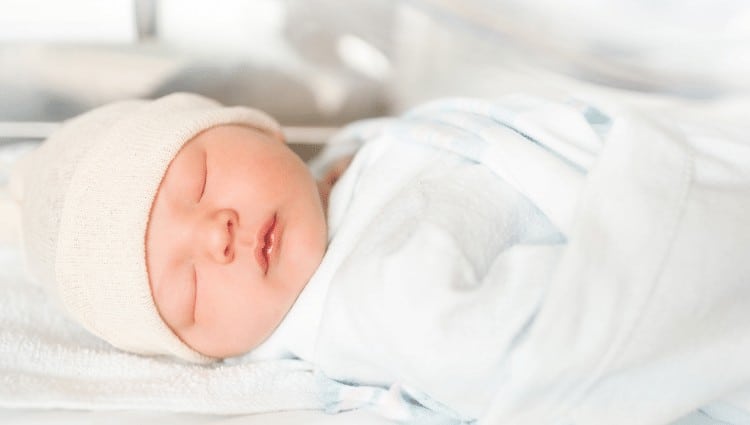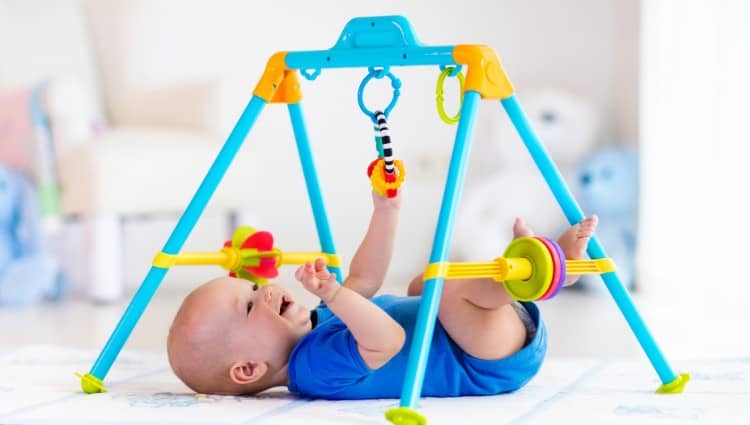Know everything to look forward to when your baby turns 3 months old
Medically Reviewed by: Dr. Kedar Patnekar (MBBS, D.N.B, D.C.H, Specialist Pediatrician) Dubai, UAE.
-
Author: Khushboo Kirale
- >> Post Created: October 15, 2020
- >> Last Updated: May 3, 2024
Your baby is 3 months old already!
Your baby is growing so quickly that the same baby at the start of the month and the end of the month might look completely different. This altered appearance could be because of the growth spurts your baby is going through.
Many parents even consider the 3 month mark as the beginning of the enchanted months in a baby’s development.
One of the 3 month milestones which is going to add a smile to your face is that your baby will be smiling and possibly even chuckling more frequently (which means they will be less cranky).
Good news for your sleepless nights – your they will start sleeping through the night (which makes you feel less cranky).
Before you start relaxing and enjoying your well-deserved sleep, your baby will go through many important 3 month milestones that you can monitor to understand their progress.
We have covered the 3 month milestones that are seen in 3 month old babies on an average. But if you don’t observe the same developmental milestones in your baby, there is no need to worry. As long as their pediatrician is happy with their growth, you should relax and enjoy the time with your 3 month old.

3 month milestones - Table of Contents
What are developmental milestones?
A new-born baby is adjusting to the new surroundings that they have been pushed into suddenly. Therefore, they are very cranky and fussy. But by the time they are 3 months old, they seem to be getting used to the environment and are now looking to grow and develop quickly so that they can enjoy everything around them.
Developmental milestones is the way you will be able to check your baby’s development easily. It will be anything that the baby has not done before or anything that has not happened to them before.
These 3 month milestones can be observed in the physical appearance of the baby, their behavior, their eating, sleeping, crying, pooping, etc. patterns, changes happening inside the body like muscles, bones, brain, etc.
So we are going to look at the average 3 month milestones of a baby. Your 3 month old baby may or may not have reached those 3 month milestones, but rest assured that they soon will.
Also remember that if your baby is premature, they will reach these 3 month milestones a little later and consequently all the other milestones in the future will also be observed later in your baby. So don’t worry.
Related posts:
- 4 Month Milestones: What are the Developmental Milestones of My 4 Month Old Baby??
- 2 Month Milestones: What are the developmental milestones of my 2 Month Old Baby??
- Your Absolute Guide to Simplify Let-Down Reflex (Milk Ejection Reflex) with 12 Tips
- Cluster Feeding – How to Identify and Manage Cluster Feeding
- Buying Diapers in Bulk? Here are 12 Best Budget Diapers you need to keep an eye out for.
3 month milestones: baby weight and height/length
Many experts have named the first 12 weeks after the baby’s birth as the fourth trimester because a lot of your baby’s growth is still happening during this time.
Your 3 month old baby probably looks completely different compared to their newborn pictures. They are now just a cuddlier version of themselves. You just want to hold and squeeze them till your heart’s content (honestly, your heart will never be content, so be careful with the squeezing).
From this month onwards, babies tend to stretch themselves out because of the growing muscles and bones. This stretching will show you how long your 3 month old baby really is. Don’t forcefully stretch them if they haven’t done it on their own. You should wait for the flowers to bloom on their own.
A baby usually gains about 1.5 to 2 pounds in weight and grows by 1 to 1.5 inches in height every month. But if your baby does not fall into this category, it is completely okay. These 3 month milestones are just averages and your 3 month old baby not falling into these ranges just means your baby is unique and will reach the required weight and height a little earlier or later than others.
Another way in which you can check their growth is comparing their current height and weight with their birth height and weight. Usually, a 3 month old baby will have gained more than 30% of their body weight and increased by 20% in height/length compared to their birth weight and height/length.
The next few months you will observe enormous growth strides in your baby as they hit more growth spurts.
What if my 3 month old baby is underweight or overweight?
Some parents are worried that their 3 month old baby is too skinny, whereas others may say their 3 month old baby is too chubby (Too Chubby!!!! Why is that even a problem???).
Before you jump to conclusions and make drastic changes to your baby’s feeding patterns, first figure out whether your baby actually has a problem. It could be that your baby is not really overweight but just baby-appropriate rounded or that your baby is not underweight but just slender because of their genetic predisposition.
To better access your baby’s 3 month milestones, always check their weight with respect to their height/length. The baby weight–height chart at your doctors can help make a more accurate assessment of your baby’s growth.
If your 3 month old baby’s height/length and their weight are on a similar curve, it would just mean that your baby is a little smaller or bigger than the average.
But if the baby’s weight appears to be growing faster than their length/height, then it would mean the baby is putting on pounds too quickly. Similarly, if the baby’s length/height is growing faster than their weight, then it would mean your baby is not putting on pounds fast enough.
Starving your baby or overfeeding your 3 month old is far from the right solution. Either way, talking to your pediatrician will help you understand the situation and rectify it appropriately.
I remember when my daughter was born, she was a preemie and, therefore, underweight. When people came to visit her they would comment “Oh! She is so tiny. You need to feed her more.” It worried me a lot that in spite of feeding her regularly and adequately, she did not put on enough weight on her first month check-up.
My doctor then reassured me that there is nothing wrong. Soon she will put on weight and become the roly-poly poster child that everybody is used to seeing. Off course, the doctor was right. My daughter took a little time, but she did catch up.
I will advise you the same. People may comment, but remember, babies come in all sizes and have their own pace. Consulting your pediatrician for any concerns that you may have is the best option to relieve you of your worries. Keep your doctor on speed dial.
3 month milestones: the five senses
Visual
- Eyesight is something that improves the most in your baby’s 3 month milestones. Your 3 month old baby does not have depth perception yet, which means they cannot judge how far or close an object is perfectly, but they can clearly identify and recognize anything which is 8 to 15 inches away from them.
- If your baby hasn’t already started to follow moving objects yet, they soon will. 3 month old babies can easily follow objects through a complete 180-degree angle.
- Newborns have trouble focusing on objects, especially when they are close to their face. They may also look a little cross-eyed when they are trying to focus. But now that your baby is 3-months old, they can focus better without the cross-eyed appearance.
- Newborns are able to see only fuzzy shapes and outlines, but one of the 3 month milestones of your baby is that they can now recognize faces. They will show you that they have recognized you by that toothless grin.
- With better vision, they are also able to increase their hand and eye coordination.
- This enhanced hand and eye coordination will help them reach and grab objects more effectively.
- With your baby’s improved vision, they can now see circular and spiral shapes more clearly. Hanging a mobile over the crib is a great idea during this time

Hearing
- Your 3 month old baby’s hearing has also improved and they will be able to distinguish between your voice and other caregivers’ voices and tones easily.
- They will show their delight when they hear you singing, speaking, or even humming.
- They will start associating your voice and tone with comfort and will smile to show that they are happy to see you; you should smile back and let them know you are happy to see them too.
- They will even try and mimic the sounds they hear. This means that your 3 month old baby is taking the first step to start communicating.
- Toys that make different sounds will attract them.
Smell & Taste
- Babies are born with a strong sense of smell, but by the time the babies are 3-months old, they have this skill down to a science. They can easily distinguish among you, your partner, and other caregivers though their scents.
- With improved smell, your 3 month old baby’s taste buds are also improving. According to research, breast milk from every woman will have a distinct taste based on the diet of the mother. When babies were fed breast milk from different woman, babies surprisingly showed a higher preference for breast milk from their mothers based solely on the taste.
Touch
- Your 3 month old baby has also developed preferences for what they like to touch. They will have textures that they like, and many kids may even have a specific blankie or toy that they love only because of the texture.
3 month milestones: all other significant changes to look forward to
- One of the prominent 3 month milestones is that your baby has reached the thumb/finger sucking stage. At this age they are very fascinated with their hands and will keep them close to their mouths consistently. If your 3 month old baby is a thumb sucker, then there is no need to worry. Thumb sucking just means that they will try self-soothe themselves if you are not around. I say that is a bonus for you busy parents, if your baby can self-soothe and comfort themselves.
- At 3-months old, your baby will be able to hold their head up high, literally, at a 90-degree angle. If they have not done it yet, make sure you give them enough tummy time, where they can put the neck muscles to work and strengthen them.
- Now that they can keep their heads up without support, you will also notice that your 3 month old baby is able to comfortably sit in your lap and hold their head fairly steady. But remember to keep monitoring them because they can topple over sometimes.
- Enough tummy time will also enable them to build their muscles so that they can lift their chest up. Their tiny bodies are becoming stronger this month.
- If your 3 month old baby has had plenty of tummy time, you may notice that their mini push-ups may eventually land them on their back when the roll over. It will initially happen accidentally, and they will be as surprised by it as you are. Eventually, they will be able to roll over at will. But the reverse roll over from their back to tummy will take a few more months.
- Have you tried to hold your baby’s hands while making them stand on their feet on a flat surface? If you have, you will notice that their knees are straighter and legs stronger this month. They will be able to support their body on their legs, with your help off course. They are slowly and steadily unwinding from that fetal position and learning how to stand like hominids. They might even enjoy going bouncy, bouncy, when you hold them in this position.
- Your 3 month old baby has started opening and closing their fingers to make fists.
- This opening and closing of fingers will enable them to grasp objects more effectively this month. Their grip may not be that strong, but they can hold and grab things like toys and rattles. This also means they will try and grab anything that dangles in front of them like your earing, hair, necklace, etc. Try and avoid wearing any jewelry as it can hurt you and the baby when they pull. Give them smaller toys that they can grasp; they will enjoy them more.
- At this age they will love toys that can stimulate their senses, like toys that rattle, squeak, or play music when the baby presses or shakes them.
- They have started smiling when they see you or hear your voice. If you are lucky enough, your 3 month old baby may even chuckle for you.
- They will keep talking to anyone who will listen to their coos, gaas, ahhs, goos, …well you get the gist that its gibberish. But your baby will be so happy to communicate with you with these sounds. Respond to them in baby talk. This will show them that communication is a two-way street.
When to Be Concerned?
As new parents, it is very easy to go overboard in monitoring your baby’s growth and progress. This monitoring and tracking can bring unnecessary stress if you see your baby’s growth deviating from the average.
Your baby’s growth deviations may cause you to worry and conclude that there is something wrong with your baby. But just because your baby has not reached a particular 3-month milestone, doesn’t mean that there is reason to be concerned.
But there are a few things that you should discuss with your doctor to help them understand and monitor your baby’s progress.
Contact your pediatrician:
- If your baby is not gaining weight or is not eating adequately
- If your baby is unable to focus their eyes on you or a particular object
- If your baby is not responsive towards loud sounds
- If your baby has not noticed their hands yet
- If your baby has not smiled yet on seeing you or hearing your voice
- If your baby is unable to follow moving objects with their eyes
- If your baby does not grasp or hold objects
- If your baby does not reach for or grasp toys
- If your baby does not babble yet
- If your baby has trouble moving their eyes in all directions
3 month milestones—your 3 month old baby’s feeding pattern
Most 3 month old babies rely on breastfeeding, formula, or a combination of both for their nourishment. As they go through growth spurts, they will get hungrier and feed more to sustain their growing bodies.
On an average, a 3 month old baby drinks around 720 to 1200 ml of breast milk per day which can be spread out in 5 to 8 feeds.
As the baby grows, they will be able to feed more each time and, therefore, require lesser feedings throughout the day.
But as your little one grows, more challenges will be encountered in you breastfeeding journey. These challenges may include going back to work, drop in the breast milk production, unavailability of pumping resources, medications that restrict you from breastfeeding, etc.

Talk to your doctor or lactation consultant to understand and overcome any of the challenges that you may encounter while breastfeeding.
If you have a medical condition that requires you to take some medication which is incompatible with breastfeeding, talking to your doctor and taking breastfeeding-safe medication can help you and your little one.
You can refer to the Drugs and Lactation Database, which lists all the medication and their side-effects on your baby and also on your breast milk production.
But if you end up in a condition where you have to stop breastfeeding, don’t feel guilty and stress out. Formula is perfectly healthy for your little one and is a valid substitute for breast milk.
How do I know my 3 month old baby is feeding adequately?
If you feel that your 3 month old baby is not feeding adequately, you can always look at their wet and dirty diapers.
Tracking your baby’s diapers is one of the easiest ways to gauge whether your baby is feeding adequately. I know looking at dirty smelly diapers is your least favorite activity, but it’s effective in tracking your newborn’s progress.
Newborns usually poop after every feed, but your 3 month old baby may poop maybe once or twice a day, sometimes even once every 2 to 3 days.
You can be satisfied that your baby is feeding adequately if your baby produces about 6 wet diapers per day.
3 month milestones—your 3 month old baby’s sleeping pattern
Newborn babies need about 14 to 17 hours of sleep per day. They will usually wake up after every 2 to 4 hours of sleep to eat.
This is absolutely true for the first 2 months, but once your baby is 3-months old, there are going to be many changes in their sleeping habits.
The growth spurts that your baby has gone through will result in their feeding capacity to increase. Their tiny bodies can now accommodate more food. So your 3 month old baby can feed more during daytime, which will mean they will need fewer feedings during nighttime.

Slowly your baby is becoming more active and alert during the day, which will make them tired and sleepy at night. This results in about 2 to 3 small naps during the day and one long stretch of 7 to 9 hours at night.
Remember, all babies are not the same, and their sleeping patterns may vary. For some babies, a long stretch at night would mean only 5 to 6 hours of sleep. But don’t worry. Soon they will start sleeping longer stretches at night, and you can get the much needed beauty sleep.
For some babies, the long stretch can also mean sleeping at 7 pm and waking up at 2 am. Even though the sleep timing is a little off, it is still a dependable stretch compared to the sleep-deprived newborn days.
If you are considering on keeping your baby awake longer so that they sleep at a more appropriate time and wake up later in the morning, then it is a misguided strategy. Forcing them to stay awake will make them overtired and make them sleep lesser at the night. Let them develop their own circadian rhythms instead of forcing it.
You can try and establish a routine for your 3 month old baby to help them sleep at the same time at night and also for the naps during the day.
Creating a bedtime routine can make your baby aware that now they will be going to bed. Your routine can be giving them a bath, changing clothes, massaging the baby, reading a story, dimming the lights, feeding the baby, singing a lullaby, etc. Whatever activities you pick in your baby’s bedtime routine, ensure you stick to them and in the same order and around the same time, only then your baby will associate those activities with sleep.
3 month milestones—your 3 month old baby’s health
As your 3 month old baby continues growing and developing physically as well as behaviorally, every tiny change in them will make you wonder whether this is a symptom for something and whether it is normal. We are listing a few of the common health problems that 3 month old babies might face:
Teething
3 month old babies don’t usually teeth, but as the age range for teething is quite wide, it is possible. It is more common for the baby to start teething when they are 6-months old or more. But there have been instances where even 3 month old babies have experienced teeth eruption. If your baby starts crying more than usual, drooling, refusing to nurse, and massaging their gums helps placate them, then your baby might be teething. Consult your doctor to be sure.
Poop
Yes, we are going to talk about the baby poop now, the bane of your existence. The color and consistency is what you need to look at. Usually healthy 3-month-old baby poop color is in the shades of green and yellow and is a little grainy and stiffer than when the baby was younger. If you see the baby poop is any other color like red, black, pale yellow, grey etc. it can be a matter of concern. Consult your doctor to be sure.
Constipation
If your baby is constipated, their poop will almost be like hard balls and their belly will feel hard and rigid. Consult a doctor immediately to relieve the baby.
Diarrhea
If your 3 month old baby’s poop is more watery and runny, then they might be suffering from diarrhea. Consult your doctor immediately.
Sneezing
I know babies look super cute when they sneeze, but if they are sneezing frequently it can be because of some allergies. Your 3 month old could be sensitive to the pollutants and irritants in the environment. Their tiny respiratory tracts are still developing and anything unusual in the system can trigger sneezing. If your baby is sneezing a lot you can treat the situation by removing the common irritants, like pet dander, dust, soft toys, etc. You can also use a cold-mist humidifier to keep the air from getting dry. If your baby also has a stuffy nose, try saline nose drops to clear the nasal passage of any irritants.
Thrush
If your 3 month old has thrush, you will notice white patches on the tongue that you are unable to clean or white patches on the inside of the cheeks. Thrush is a mild yeast infection which is common in babies and can be easily cleared up with some prescription medicine like Nystatin, after checking with your doctor. Infants can develop thrush if they are breastfeeding or if you or your baby is on any antibiotics.
Baby acne
If your 3 month old has baby acne, flaky skin, or drooling rashes, don’t worry, it usually clears on its own without treatment. Infants can also suffer from dry skin, so use mild soaps and creams to ensure the moisture is locked into the skin. Using a mild moisturizer 1 or 2 times a day can help. Avoid baby wipes that have alcohol, as they will make the skin dry. If your baby is drooling a lot, you can use a bib to prevent the drool from touching the skin.
Diaper rash
Those pesky diaper rashes are unavoidable. At some point all babies get it. Diaper rash will clear up in a couple of days with the help of rash creams. Diaper rashes can be prevented by using diapers that are made from natural materials like cotton, changing the diaper frequently so that the wetness does on last long on your baby’s skin, making sure the baby gets enough time without a diaper to ensure air circulation, upgrading the diaper sizes when the baby grows, etc. You can also apply diaper rash cream when you are travelling to avoid diapers rashes from appearing. But if the rashes are not clearing up in a couple of days and appear bright red, it could also be a fungal infection, which can be cleared with the help of anti-fungal cream. Keep your doctor posted if the rashes are persistent.
Upper respiratory infections
If your baby has an infection or has a runny nose, it can be difficult to manage at this age. Babies can get extremely agitated and cranky and you might reach for some over-the-counter medication to help them. But these medicines are not the safest choice for a 3 month old baby. Instead use saline drops and a bulb suction to keep the baby’s nasal passage clear. If the runny nose is accompanied by a high fever, difficulty in breathing, or no sign of improvement even after 10 days of home remedies, contact your pediatrician immediately.
Heat rash
A hot and humid climate can affect your baby and heat rashes may appear on the arms, legs, neck, or the diaper area. There is no need to apply any special creams or ointments. Try using cool water to clean the skin and then dry completely. Dress the baby up in dry and cotton clothing and keep them out of heat. Heat rash will typically go away in a couple of days. Contact your pediatrician if the rashes are persistent.
Eczema
If the crooks of the elbow and knees show red, itchy, and scaly patches, then your baby probably has eczema. Your pediatrician will diagnose the condition and provide treatment options. Avoid strong scented baby soaps and other baby products. Ensure that the clothes your baby wears are washed with mild detergents and are not prickly. Bathing the baby not more than 3 times in a week is preferable.
Allergies
Your 3 month old may also have some allergies or sensitivity that haven’t been diagnosed yet. If your baby is excessively fussy, vomits after every feed, the poop is very watery, bloody stools, rashes on the body, etc., then these could be signs that your baby is allergic to something. Consult your doctor to find the allergen that is affecting your baby and the corresponding treatment plans.
3 month milestones—checklist and tips for your 3 month old baby
- First and foremost, you should visit your 3 month old baby’s doctor for their monthly check-up. Don’t worry, there are no shots waiting for your baby this month.
- If you are feeding your baby breast milk exclusively, then you may want to ask your doctor about vitamin D supplements.
- Their communication skills are improving this month. Reading to them every day will help your baby grasp the language faster. Use books with colorful pictures or even with different textures that they can feel. Such books will captivate them and help them learn.
- Along with the basic feeding and routine baby care, you also need to take care of your 3 month old baby’s intellectual stimulation. Don’t worry, it is easier than it sounds. Just singing and talking to them can shift your little one’s brain into high gear. After all, they are just 3 months old, what did you expect, teaching them calculus.

- As they have started recognizing sounds and tone, it is good time introduce them to their name. Try replacing a character in the book, song, or rhyme with their name. This way they can get used to it and recognize it sooner.
- Your 3 month old baby must have turned into a pro by now at tummy time. To further stimulate their muscles and hand–eye coordination, roll a ball near them and see if they are able to grab it. Initially your baby may find it a little difficult, but soon they will master the skill.
- As your baby becomes stronger, their kicks will be more vigorous.
- Nappy changes with those kicking legs can become difficult. To add to the kicks, 3 month old babies can even start swaying backwards and forwards and side to side. Strap them properly while nappy changes and give them a toy to play with or just sing and talk to them. This will distract them and you can change the diaper. But make it quick, they can get bored of the activity and start kicking again. Consider your diaper stations as pit stops where you need to make the changes as quickly as possible.
- According to research, hugging your baby can help develop their cognitive abilities. So hug your baby every chance you get.
- To promote health and wellness of your 3 month old baby, you can also give them a relaxing massage. Once my babies were 3-months old, I gave them massages with baby oil and some light stretching. This helped in not only strengthening their body but also made my babies happy and giggly. But always consult your doctor and understand the right technique of massaging a 3 month old baby before you start experimenting on your own.
- Always keep a 45 minutes gap between feeding and the massage.
- This is the time you can start getting into a routine so your baby can anticipate things accordingly. You can create anchors like, a special feeding chair, bath before bedtime, reading books after tummy time, etc. If you perform all the activities of the day in a sequence and around the same time every day, your baby will eventually get habituated and settle into a baby schedule. Establishing such schedules or routines can help to plan and execute other things in your life not baby related.
Final thoughts
All the developmental milestones, including the 3 month milestones, are just checkpoints on the road of your baby’s growth and development. Everybody cannot reach the same checkpoints simultaneously. Some may reach early, some may reach late, and some may be right on time.
Similarly, some babies can reach their 3 month milestones earlier than others, while some babies may be a little late to reach their 3 month milestones. Sometimes the baby can even skip certain milestones and portray other milestones a little later.
I remember that my younger sister never learned to crawl, she directly started climbing and walking, but she did not speak a word till she was 2-years old.
So always keep this in mind when you are trying to monitor your baby’s progress through the 3 month milestones. Don’t go through unnecessary stress and anxiety if you don’t see your baby hitting the 3 month milestones.
Everybody can be happy if we just remember to look at our babies are a whole person and not just as a set of skills or 3 month milestones that should be measured and analyzed.










I found your blog on yahoo and can bookmark it currently. carry on the nice work.
Thanks Eva for the sweet words
There are a few fascinating points over the time in this posting but I do not know if I see each one of them. Good post , thanks and that we want far more!
Good post.
My baby doesn’t sleep at night. Hope this improves quickly.
My baby has already reached certain milestones mentioned by you. He is just 2 months old. Any which ways, nice write-up, very informative.
Thanks for this post, I am a big big fan of this website would like to continue updated.
Thank you Bella. I am glad you liked our blog.
Thank you for another magnificent article. I have a presentation next week, and I am on the search for such info.
Thank you for encouraging words.